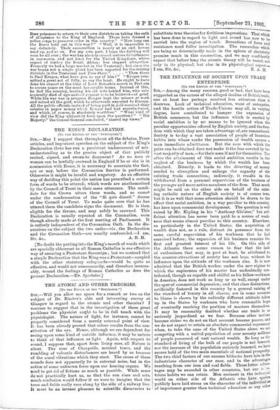THE ATOMIC AND OTHER THEORIES.
['To THE EDUCE OF THE "SPECrATOR."1 SIR,—Will you allow me space for a remark or two on the subject of Dr. Ricker's able and interesting survey at Glasgow in regard to the atomic and other theories P I venture to suggest that in the investigation of these great problems the physicist ought to be in full touch with the physiologist. The nature of light, for instance, cannot be properly considered from a merely external point of view. It has been already proved that colour results from the con- stitution of the eye. Hence, although we are dependent for seeing upon some kind of outside influence, it may be untrue to think of that influence as light. Again, with respect to sound, I suppose that, apart from living ears, all Nature is silent. The roar of Cheapside, musical tones, and the rumbling of volcanic disturbances are heard by us because of the aural vibrations which they start. The cause of these sounds does not apparently lie in external noise, but in the action of some unknown force upon our hearing organs. We need to get rid of fictions as much as possible. While some do not practically hurt us, as that the sun rises and sets, much confusion would follow if we were to imagine that the trees and fields really race along by the side of a railway line. It must be an intense pleasure to scientific discoverers to tested, o t substitute true theories for fictitious impressions. That which has been done in regard to light and sound has now to be carried into the region of touch. Sensations of force and resistance need fuller investigation. The researches which are being so determinedly made in the spwheillre beef
promise much in this connection, and we may confidently expect. that before long the atomic theory
only in its physical, but also in its physiological






































 Previous page
Previous page